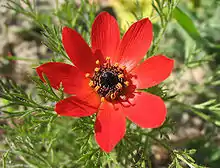Adonis annua
Adonis annua (syn. Adonis autumnalis L.,[1] Adonis phoenicea Bercht. & J.Presl.[1]), also known[† 1] as pheasant's-eye,[4] Adonis' flower, autumn Adonis,[4] autumn pheasant's-eye, blooddrops, red chamomile, red Morocco, rose-a-ruby, and soldiers-in-green, is an ornamental plant of the family Ranunculaceae.
| Blooddrops | |
|---|---|
 | |
| Scientific classification | |
| Kingdom: | Plantae |
| Clade: | Tracheophytes |
| Clade: | Angiosperms |
| Clade: | Eudicots |
| Order: | Ranunculales |
| Family: | Ranunculaceae |
| Genus: | Adonis |
| Species: | A. annua |
| Binomial name | |
| Adonis annua | |
It is native to North Africa, Western Asia, the Mediterranean, and Europe. The name Bird's Eye is also associated with the bird's-eye primrose. Pheasant's eye is also an alternative name for poet's narcissus.
Adonis annua grows to a height of 10 in (25 cm). The flowers are often scarlet in color with darker spots at the base.
In the UK, Adonis annua is endangered and listed as a priority species under the UK Biodiversity Action Plan.[5]
The leaves and roots are poisonous to humans and livestock.[6]
References
- Adonis annua L. in The Plant List
- Temple Henry Croker, Thomas Williams, Samuel Clark, The complete dictionary of arts and sciences, 1764
- "Selby's Flycatcher" in John James Audubon, Ornithological Biography, 1831.
- Adonis annua L. in Tropicos
- "Pheasant's-eye". plantlife. Archived from the original on 2013-03-08. Retrieved 2012-12-05.
- Umberto Quattrocchi (May 3, 2012). CRC World Dictionary of Medicinal and Poisonous Plants. CRC Press.